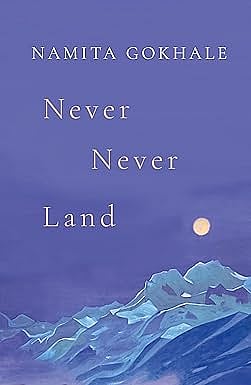Lost and Found

The Digital Age promises unlimited information, except how useful is it to know where a certain celebrity vacationed, or how an influencer got snubbed at a party? Similarly, Iti the protagonist of Namita Gokhale’s new novel Never Never Land, who is tired of living under the “grey rag,” of a Gurgaon sky, is exhausted of social media and its demands. She is also tired of apologising for never participating in her school WhatsApp group and editing books in extreme isolation. She even imagines cops breaking down her door only to discover her dead body. And thus, in barely six pages, she packs up on an impulse and hails a cab to her childhood home, The Dacha in Kumaon.
Iti was brought up in Kumaon, where she is closest to her 90-year-old grandmother, Badi Amma who works as a house help for the 102-year-old Rosinka Paul Singh. As social networks and internet cables are yet to reach the mountains, Iti slowly untethers herself from her online life and her defining LinkedIn title—‘Freelance Editor’. She gets to see life through the eyes of these two remarkable women, who have lived mostly on their own, since the early deaths of their husbands. To provide a counter-perspective, there is Nina, a mysterious Gen-Z girl who matches the colour of her lenses to her moods.
Imran Khan: Pakistan’s Prisoner
27 Feb 2026 - Vol 04 | Issue 60
The descent and despair of Imran Khan
Never Never Land (also meaning a utopia) often reads like poetry in prose, sample this, “The light was translucent, and raindrops trembled like festive fairy lights along the pebbled path.” As Iti tries to archive the memories of both the elder women, she also untangles her own problems. This is an emotional coming-of-age story as Iti, during just one monsoon, explores the many facets of friendship, youth and age.
The book gently peels away each character’s secrets as Gokhale expertly interweaves Iti’s diaries, an omniscient narrator’s voice and Rosinka’s dream diaries. Since Iti is an aspiring writer and editor, there are many musings on the written word. “There are more important things in life than books, I’ll be the first to admit it, but words are sacred. I sometimes think that at the root of all tragedies of this world are words used without care, without understanding,” writes Iti in her diary.
While the female world with its friendships, jealousy and desire to belong are vividly captured, so are the vulnerabilities, glimpsed through chewed nails and soiled beds. Gokhale seamlessly folds in love and hate, friendship and jealousy and the many incongruencies that make up life. A teenager Iti’s sexual awakening at the hands of a paedophile is particularly haunting. “The encounter had terrified me, but somewhere, I felt special in being thus sought out,” she writes recounting the incident.
While the book flows like a stream with several undercurrents, its humour makes it special. Soft chuckles happen when The Dacha is called the Chacha by the locals or when one of Iti’s ex-lovers asks her to edit his magnum opus, For Whom the Bell Tolls. Subtle lines such as, “He took care while rolling on his condom and rolling off his socks (in that order),” make you want to return to this short read.
While the characters breathe and cry in these pages, the mountains too come alive as “jagged pines and blue skies and the whispering wind.” But besides the magnificent view, landslides, helicopter crashes and incessant rains threaten this fragile landscape. Gokhale who was raised in Nainital and time and again, has written about these parts, puts a twist on the rampant ‘development’. In the novel Badi Amma says, “Uttaranchal, our Uttarakhand, is the Dev Bhoomi, the land of Gods…Now the Mountain Gods are impatient beings—they like solitude…So they have decided to push away the tourists…who are polluting our Dev Bhoomi.”
Pick up Never Never Land if you pine for the solace of the Himalayas. Unlike grand narratives, you may find this novel quietly resounding in your mind like a mountain echo.

